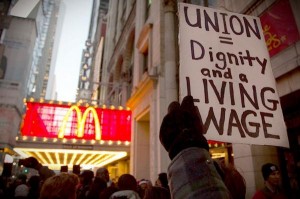 Labor advocates are claiming a big victory after a federal agency said Tuesday that McDonald’s central, corporate operations can be lumped in with its thousands of franchises for liability purposes. The NLRB has determined that 43 of 181 complaints filed since November 2012 have merit to proceed, the agency says on its website. Of those “43 cases where complaint has been authorized, McDonald’s franchisees and/or McDonald’s, USA, LLC” — the central, corporate entity — “will be named as a respondent if parties are unable to reach settlement.”
Labor advocates are claiming a big victory after a federal agency said Tuesday that McDonald’s central, corporate operations can be lumped in with its thousands of franchises for liability purposes. The NLRB has determined that 43 of 181 complaints filed since November 2012 have merit to proceed, the agency says on its website. Of those “43 cases where complaint has been authorized, McDonald’s franchisees and/or McDonald’s, USA, LLC” — the central, corporate entity — “will be named as a respondent if parties are unable to reach settlement.”
If we are reading this ruling correctly, that means that if a local franchisee of a home care company like Home Instead Senior Care, Comfort Keepers, or Visiting Angels is faced with complaints to the NLRB that the corporate franchisor could be held liable as well.
U.S. Chamber of Commerce spokesman Randy Johnson says in a news release the NLRB move “upends existing law and is part of a larger agenda at the NLRB to overturn the joint-employer standard.” Another Chamber exec, Glenn Spencer, calls it “a ploy that could threaten nearly 800,000 franchise businesses and the millions of people who work for them.” The key phrase in the NLRB decision is “joint employer” — that’s the term that the agency’s general counsel, Richard Griffin Jr., says can apply to the corporate entity, thus linking it to the franchises. Griffin is a former NLRB board member and served on the board of directors for the AFL-CIO lawyers coordinating committee.
McDonald’s has about 3,000 franchises in the U.S., according to the company’s website. The company has a total of about 14,000 restaurants in the U.S. In the home care industry, there are 58 companies selling franchises in the US and Canada, with about 5,500 locations.
“McDonald’s also believes that this decision changes the rules for thousands of small businesses, and goes against decades of established law regarding the franchise model in the United States,” says Heather Smedstad, speaking on behalf of the company.
Smedstad, senior vice president over human resources in the U.S., says in a release that the fast-food giant “as well as every other company involved in franchising, relies on these existing rules to run successful businesses as part of a system that every day creates significant employment, entrepreneurial and economic opportunities across the country.”
What do you think? What effect might this ruling have on home care companies that are part of franchise organizations?



